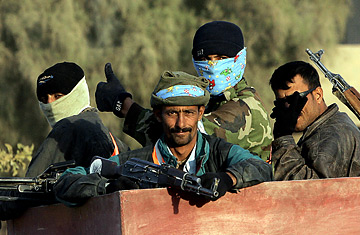
Members of a Concerned Local Citizens (CLC) brigade patrol in the village of Sufeit, south of Baquba, in November.
In Iraq, it is big news when a Shi'ite leader extols the virtues of Sunni fighters. But that is what happened just a few days ago, on Dec. 21, when Abdul-Aziz al-Hakim, the leader of Iraq's largest Shi'ite political party, offered some praise for the mostly Sunni volunteers who have been key to this year's dramatic drop in insurgent violence. "They are practicing an honorable role, they are expressing the unity of Iraqis in confronting the enemies of Iraq."
Hakim, however, mentioned them in the same breath as the Shi'ite-dominated Iraqi army and police. And he stressed that the ultimate legitimacy of the so-called "Concerned Local Citizens" (CLC) program hinged on incorporating its members into the government's security forces. Echoing the view of the Iraqi and American governments, Hakim insisted that the program should "not be a substitute for" the Iraqi Army and Police.
But that is precisely the problem. According to the U.S. military, the vast majority of CLCs — about 50,000 out of more than 70,000 — have no interest in joining Iraq's police force of army. They joined the program for the prospect of a steady paycheck in Iraq's moribund economy, and remain mistrustful of the Shi'ite-dominated government and its security forces.
The Iraqi government, in turn, is wary of integrating more than a small number of CLCs into the army or the police. Sometime next year then, tens of thousands of armed Sunni men — many with insurgent backgrounds — will find themselves unemployed. If that happens, the dramatic security improvements of 2007 may not survive in 2008.
American commanders are open about the CLCs' motivations; patriotism is not high on the list. Gen. Mark Hertling, who commands American forces in northern Iraq, said at a press conference last week that most volunteers were in it for the paycheck they received via the U.S. military. "They're doing that to get a job, primarily," he said. A CLC fighter gets paid roughly $300 a month, slightly less than his counterpart in the Iraqi police force. Nevertheless, of the 15,000 volunteers in his area, Hertling said, only about 20% have expressed an interest in joining the government's security forces.
But in a country with such high unemployment (17% is a very conservative estimate), men have been clamoring to participate in the program. The number of volunteers greatly exceeds what American commanders say is necessary for security. Qais al Jabouri heads up a group of CLCs in Madain, an area just outside Baghdad. Earlier this month, at a meeting hosted by the U.S. military, he and other Iraqis complained that too few volunteers were being allowed to participate in the program. Afterward, in a phone interview with TIME, he said that in some cases he wanted ten times more CLCs in a given area than the US military felt was appropriate.
Col. Wayne Grigsby, who commands a U.S. Army brigade in Madain, said that they were not turning volunteers away. Instead, a lump sum is provided by U.S. military to local Iraqi leaders that is then divided among all the CLCs. The intent is to encourage Iraqis to keep the number of CLCs down, so that each man's salary does not suffer. Instead, men like Jabouri have divided the money among an ever-growing number of volunteers (resulting in some fighters' receiving just $70 a month), and then lobbying the U.S. military and the Iraqi government for more financial assistance.
Grigsby is aware that some Iraqi leaders are tempted to treat CLC groups as a way to provide employment to men in their communities. He stressed that it was not designed to be a jobs program. "The intent of the program is not economic development," Grigsby said. "The intent of the program is security." That distinction, though, is lost on many Iraqis.
The Americans say they are already looking ahead to what will happen to CLCs who do not become police or soldiers. On the afternoon of Dec. 23, Ambassador Ryan Crocker emphasized to reporters that the U.S. has already begun a $155 million program designed to provide vocational education and job training to CLCs. But, as with many initiatives in Iraq, the jobs program will, in the end, depend on the Iraqi government. It has pledged $155 million of its own. But Iraq's corrupt and sectarian government has so far been unable to move forward on basic issues like how to share oil revenue. Its willingness and ability to administer a jobs program for Sunni men is questionable to say the least.
In any case, the limiting factor may not be how much job training the CLCs have. The more serious concern is that Iraq's shaky economy simply may not have enough jobs to go around. Even with violence falling, unemployment remains high. If the security situation deteriorates further, the economic picture will only get bleaker. At that point, former CLCs may be faced with a choice between unemployment and a return to the ranks of the insurgency.
